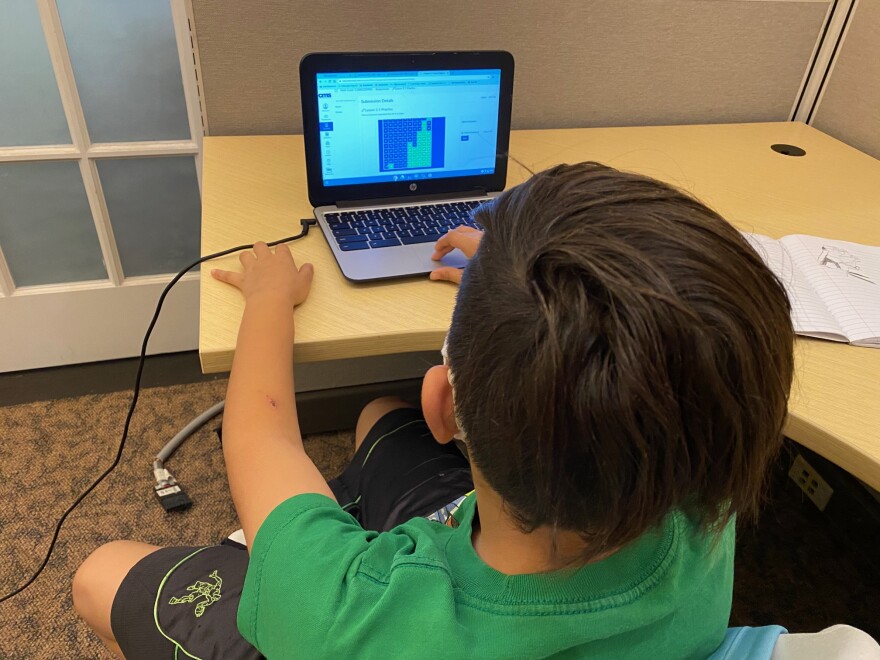The latest test scores brought more evidence that online education doesn’t work well for most students, whether they’re in virtual charter schools or online academies created by school districts during the pandemic. But state officials say virtual classes remain in high demand with some families.
North Carolina’s two online charter schools scored low on proficiency and on student progress in 2022. It’s a familiar pattern since 2015, when the General Assembly authorized them to open. North Carolina Cyber Academy and North Carolina Virtual Academy, which take students from across the state, have been rated low performing every year that they’ve been open.
Cheryl Turner, who chairs the state’s Charter School Advisory Board, says most charter schools would face the prospect of having their public money cut off after five years without improvement.
"Revocation would be an option that would be on the table if you were low performing and not making growth," she said in a recent interview.
But the virtual charter schools are a state pilot program, authorized to run through 2025 without facing the normal renewal process. And when the pandemic hit, the General Assembly authorized them to take extra students. Last year the two combined served about 5,700 students in grades K-12. They got more than $42 million in state money and more than $10 million in federal money (read a new state report on the virtual charter schools here).
Turner spends a lot of time analyzing charter school performance, in her role on the advisory board and as the head of Charlotte’s Sugar Creek Charter School. She says the virtual schools’ persistently low performance is a puzzle.
"I don’t really understand why growth looks like that, why they don’t see the kind of growth that brick-and-mortar schools can see," she said. "But the fact that it’s consistent suggests to me that there is a reason. I just don’t know what it is."
The pandemic created a broader basis for comparison, as school districts across the state created virtual academies for families worried about sending their kids back for in-person learning. On Wednesday state Charter School Director Ashley Baquero told the state Board of Education there were 31 virtual academies, including the two statewide charter schools, that got letter grades.
"Twelve had an F, 11 had a D and eight had a C," she said. "There were none that had received an A or a B."
The state’s growth measure, which analyzed the amount of progress students made in math, reading and science last year, tells a similar story. Johnston County’s K-12 virtual academy came in dead last among more than 2,500 public schools. The statewide virtual charter schools were also extremely low on growth, and so were Charlotte-Mecklenburg Schools’ new virtual elementary and middle schools.
CMS has already started phasing out its virtual elementary school. Deputy Superintendent Matt Hayes says the demand created by the pandemic is drying up, and the online model doesn’t work well for most young children.
"The elementary years are critical to a student’s academic success. You develop the building blocks to everything else that’s needed throughout their academic career," Hayes said. "Many of the strategies and tools and resources that they have in which to strengthen that learning opportunity for students, do not transition well to a virtual model. They don’t."
Baquero says despite years of low ratings, demand remains high for the virtual charter schools, especially in high school. Both have long waiting lists this year: more than 1,000 high school students at the Cyber Academy and almost 1,200 at Virtual Academy.
Turner agrees it’s important to have virtual school as an option because families want it. She says students often move in and out of virtual charters based on circumstances: "Illnesses, family schedules. Some of them are into, you know, sports and things that require that they have to go to a whole bunch of practices or whatever. Distance to the school."
One thing that creates confusion is that there’s also North Carolina Virtual Public School, which is different from the Virtual Academy charter school. NC Virtual isn’t really a school; it’s a Raleigh-based program that offers individual online classes to students attending other middle and high schools. Many schools use it to expand course offerings, and CMS is using it to help fill gaps created by teacher vacancies this year. Because students don’t attend NC Virtual full time, there are no grades or growth scores.







